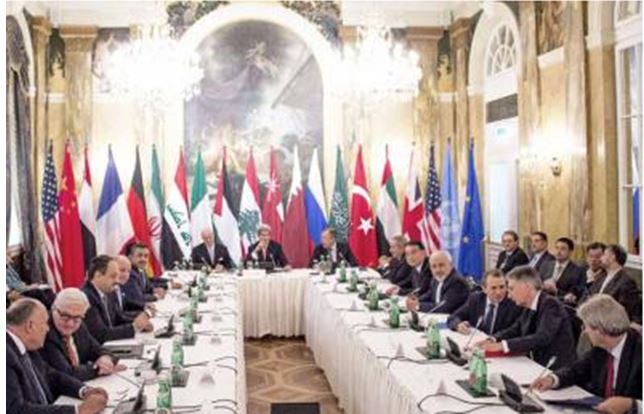Swiss cheese
Michael Young/Now Lebanon/February 05/16
The suspension of negotiations in Geneva to end the Syrian conflict represents a major setback for the United Nations. It not only reflects deep mistrust between the Syrian parties themselves, but also between the regional and international backers of the Syrian opposition. Worse, it reflects the Syrian opposition’s doubts about the UN envoy, Staffan de Mistura, who played a key role in preparing the Geneva meetings.
With so much mistrust flying about, what are the chances that if negotiations resume on February 25, as De Mistura intends, they can advance any further than they have until now? If a new round of negotiations is prepared with as little groundwork as was the last round, we should not expect much.
Geneva suffered from three concentric problems. The first is that the Syrian government and its Russian and Iranian allies had no incentive to make humanitarian concessions or interrupt their assaults on civilian areas as the opposition had demanded, thereby facilitating a breakthrough in negotiations. The Syrian regime is making military headway, in the south, in Latakia province, and in Aleppo. Why break the momentum of successful offensives that are allowing it to strengthen its leverage down the road?
Second, while the animosity between the regime and the opposition was always a given, we are now seeing growing suspicion from regional supporters of the Syrian opposition, above all Saudi Arabia and Turkey, of the behavior of a central actor in the Geneva saga, namely the United States.
The Saudis and Turks are those with the weight to push the opposition into making compromises. However, what both feel today is that the Obama administration has been mainly unsympathetic to their interests in the run-up to Geneva. The Turks see the Americans moving closer to the Kurds, and the visit to Kobane last weekend by Brett McGurk, Barack Obama’s envoy to the coalition fighting ISIS, only increased their fears.
As for the Saudis, they are warily watching the increasing coordination between the United States and Russia in Syria, as well as the rapprochement between America and Iran. They recall that it’s the Americans who urged the Syrian opposition to be flexible over Bashar al-Assad’s future, and sense that the administration is not serious about getting rid of the president.
To the Saudis, Geneva must have seemed like an effort to railroad the vulnerable Syrian opposition into a process in which they were likely to lose. The Americans have appeared so eager to arrive at a settlement at any price, that they have come across as willing to accept a bad deal to none at all. And with Russia and Iran holding the strong cards, this is more probable by the day.
A third problem is that doubts have arisen among the Syrian opposition about the intentions of De Mistura. The UN envoy has a mandate from hell trying to bring together different parties that have no desire to deal with each other. However, going ahead with Geneva when nothing had been done about Syrian regime and Russian attacks against civilians was always bound to do one thing only: discredit the opposition delegation in the eyes of many Syrians.
De Mistura now appears more sympathetic to the opposition’s demands that the bombardment of civilians must cease and that humanitarian aid must be secured to areas under siege. This represents implicit recognition on his part that he erred in not making it a basis for the Geneva talks in the first place.
To the Syrian opposition De Mistura was willing to rely on outside pressure to shoehorn them into discussions about which they had deep misgivings. The UN envoy cannot afford to be seen as colluding with the Syrian regime and the Russians, even if the accusation is unfair. His mission depends on it.
As for the Americans, whatever happened to their preferred notion of adopting confidence-building measures to facilitate talks? On Wednesday US Secretary of State John Kerry declared, “The continued assault by Syrian regime forces–enabled by Russian airstrikes–against opposition-held areas, as well as regime and allied militias’ continued besiegement of hundreds of thousands of civilians, have clearly signaled the intention to seek a military solution rather than enable a political one.”
Thank heavens Kerry has discovered the real world, but he has done so too late. Instead of strong-arming the opposition into going to Geneva–ensuring it would be condemned if talks continued while civilians were being killed–the secretary should have backed their legitimate humanitarian demands in his interactions with the Russians. Had he been unable to achieve results, he should have warned De Mistura that Geneva would fail.
The slapdash way in which Geneva was put together was not reassuring. De Mistura and the UN have egg on their face because of their failure to prepare the groundwork to ensure that the negotiations would succeed. The envoy’s next target date later this month seems illusory. By then the Syria regime and its allies may well be in the midst of their long-awaited offensive in Aleppo, which means that talks will be further delayed.
De Mistura might want to chat with Kerry before then. If the Syrian regime and Russia want to impose a military solution, as the secretary now admits, there is not much point negotiating. Assad’s foes realized that from the start, but the Americans forced them to go to Geneva anyway. Now Kerry has changed his mind. Pity the Syrians their reliance on erratic diplomats.
**Michael Young is opinion editor of The Daily Star newspaper. He tweets @BeirutCalling.























